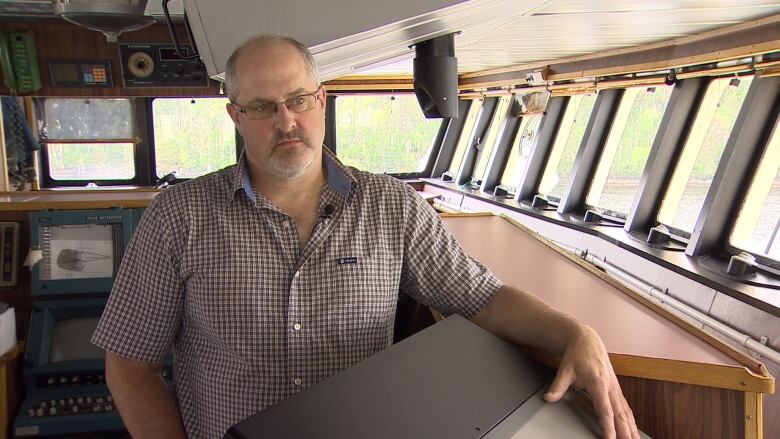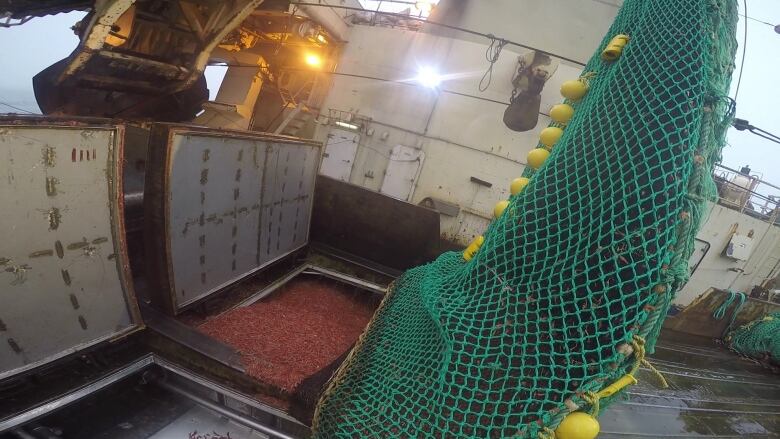Nova Scotia fish companies fight to keep northern shrimp quota
Who gets to catch plummeting northern shrimp stocks off Newfoundland and Labrador?
The Nova Scotia government weighed in Thursday on a simmering dispute over quota for northern shrimp off Newfoundland and Labrador.
The province's Minister of Fisheries and Aquacultureis urging Ottawa to maintain the existing allocation system to protect an industry worth $131 million in Nova Scotia.
"Nova Scotia companies relied on that protection when they agreed to expand the fishery," said Keith Colwell in a statement issued Thursday on the eve offederal hearings in Halifax.
"Last-In, First-Out protects the offshore fleet who were the original participants in the fishery and it needs to remain."
Fighting to keep quota
Nova Scotia fish companies that pioneered the offshore northern shrimp fishery are fighting to keep their share of quota as the Trudeau government faces its first major fisheries decision in Atlantic Canada one that pits province against province.
The question is, who gets to catch a plummeting northern shrimp stock off Newfoundland and Labrador?
"We're being used to fix a problem we didn't create," said Andrew Titus, captain of the Mersey Phoenix, a Nova Scotia-based factory-freezer shrimp trawler.
"If they change those rules, that is a direct hit to us.... They want to kick us out of an area where we have been fishing since 1978," said Titus, an employee of Mersey Seafoods.

Why 'last in, first out' policy matters
The so-called last in, first out policy known as LIFO in bureaucratic jargon has been used to manage quota sharing for decades, including the northern shrimp fishery. It means the last entrants to a fishery are the first out when a quota is cut.
Nova Scotia companies including Mersey Seafoods were among the first into the northern shrimp fishery in the late 1970s.
Newfoundland's 65-foot [19.8-metre] inshore fleet joined in 1997 with the LIFO principle clearly in place for the past 19 years.
Newfoundland licensed shrimp-processing plants in coastal communities, and everything was fine until the stock plunged.
What's at stake in Area 6
The fishing grounds at stake are known as shrimp fishing Area 6, which lies off northern Newfoundland and southern Labrador.
This year, the total catch in Area 6 is 48,196 tonnes that is over 48,000,000 kilograms.
Four Nova Scotia companies now own 60 per cent of the offshore fleet, which has access to 13,000 tonnes of shrimp in Area 6.
It is fished in the winter when more northerly areas are iced up. The winter fishery in Area 6 makes the offshore northern shrimp licence a year-round operation. The quota represents 35 per cent of the value of all offshore northern shrimp landings for the sector.
Licence distribution by province
Offshore northern shrimp quota is shared between 17 licences. They are allocated this way:
- Nunavut 1.5
- Quebec 3.5
- Newfoundland 8
- Nova Scotia 2
- New Brunswick 2
Over time, Nova Scotia companies have gradually come to fish offshore licences allocated to other provinces.
The four Nova Scotia companies are Mersey Seafoods, which has the two Nova Scotia licences.
Clearwater Seafoods fishes with two Quebec licenses.
MV Osprey Limited of North Sydney fishes with one New Brunswick licence and two Newfoundland licences.
Davis Strait Fisheries fishes with a Newfoundland licence.
The Nova Scotia companies employ Newfoundlanders and some have business relationships with Newfoundland processors.
Shrimp stocks crashing

Conflict over the resource arose when the stock started dropping. Some say it matched the return of northern cod.
In January 2016, the Department of Fisheries and Oceans reported the fishable biomass in Area 6 dropped 41 per cent between 2014 and 2015. A big quota cut is coming.
To protect its shrimp fleet and coastal processing plants, Newfoundland is urging Ottawa to throw LIFO overboard.
An all-party committee recommended taking quota from the offshore fleet or even removing it entirely from Area 6.
That's what upsets Titus, who says the Department of Fisheries and Newfoundland interests created their own problem by overbuilding.
"The mistake was made upon the entrance by the amount of fishermen from Newfoundland all at once. The issue is fleet rationalization," he said.
"Why are we being drug into this, using us as a fix? We're not a fix. We've been here since 1978. They need to fix their problem and leave us out of it."
'Rigged' review?
To address a groundswell of concern from Newfoundland and Labrador, a campaigning Justin Trudeau promised to revisit the LIFO policy on northern shrimp. After coming to power, the new government created an external review panel to study the policy and report back.
The panel has held seven hearings so far from Iqaluit to St John's. On Friday, the panel will hold its lone Nova Scotia hearing in Halifax.
Conservative MP Mark Strahl claims the panel is a sham.
"The Minister of Fisheries' advisory panel to study northern shrimp allocation is woefully unbalanced and biased," Strahl told the House of Commons May 20.
3 or 4 panel members from Newfoundland
"Three of the four panel members are from Newfoundland, including Trevor Taylor a former member of their house of assembly. In their assembly, he called for any allocation of shrimp in present or in the near future be restricted to Newfoundland interests."
Strahl went on to accuse Taylor of being in a conflict of interest because his wife is a chief negotiator for an Inuit land claim company which appeared before the panel in Iqaluit to oppose the LIFO policy.
"This panel appears to be rigged by the Liberals Mr. Speaker, Trevor Taylor was already biased going in, now he seems to be in a clear conflict of interest."
The Liberals have ignored those accusations.
Where are Nova Scotia Liberal MPs on this?
It's estimated 200 to 300 Nova Scotians are directly employed by the northern shrimp fishery. Mersey Seafood trawlers based in Country Harbour inGuysborough Countyemploy between 42 and 45 people on each of its vessels. Crew members come from Canso to Lockeport.
CBC News contacted five Nova Scotia Liberal MPs in affected areas for their position on this issue, including the province's representative in cabinet, Treasury Board president Scott Brison.
On Brison's behalf, senior aide Dale Palmeter rejected the premise of Strahl's claim.
"Once the DFO minister has received the advice of the panel, the government will consider appropriate management measures for the northern shrimp fishery," Palmeter said in an email.
'Everyone may need to take a cut'
Bernadette Jordan, MP for South Shore-St. Margarets, said she supports the last in, first out policy.
"The northern shrimp industry is significant in South Shore-St. Margarets and across the province, creating strong, year-round jobs for Nova Scotians. I do support the principles of LIFO, while respecting the independence of the panel to conduct their review in a balanced way," Jordan said in an email.
Mark Eyking, MP for Sydney Victoria, also sent supportive signals.
"The science says we need to cut back. I agree with this. Everyone may need to take a cut. But since the N.S. fishers were the first ones in the industry and developed it, I think LIFO policy should have some bearing on the future allocations."













_(720p).jpg)


 OFFICIAL HD MUSIC VIDEO.jpg)
.jpg)



























































































